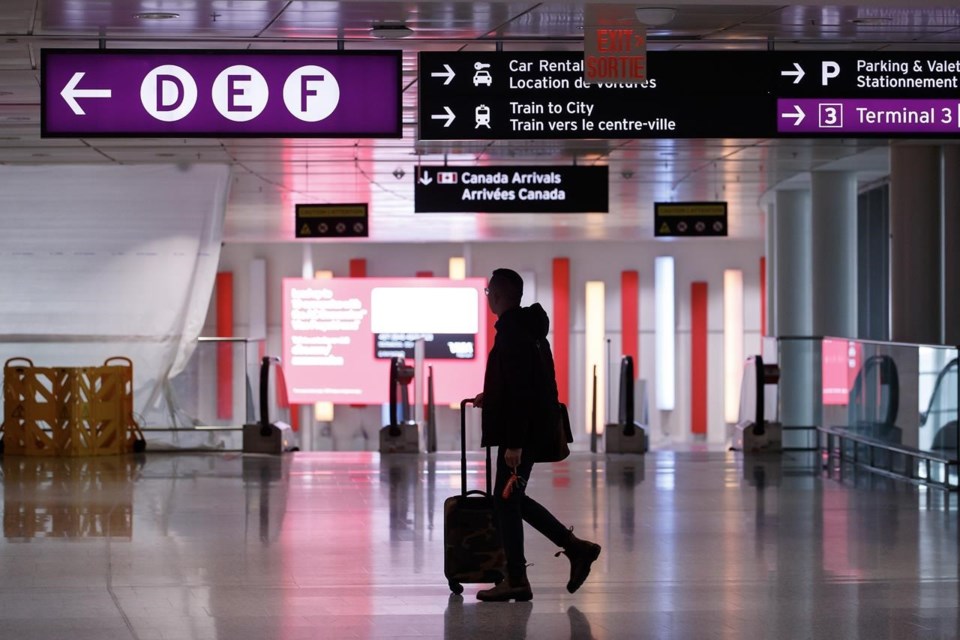MONTREAL — Demand for air travel may be levelling off after climbing close to pre-pandemic levels over the summer, as the rising cost of living weighs on Canadians' wallets.
Airline ticket sales dropped from September to October, when they typically rise ahead of the holiday season, said FlightHub travel agency CEO Christopher Cave.
"There is a bit of anxiety around ticket prices. There is a bit of anxiety around the overall economy, interest rates and so on. So we have to anticipate the potential softening of the travel market over the next 12 months," Cave said in a phone interview.
Sales at U.S. travel agencies in October fell five per cent below levels from September and two per cent from a year earlier, according to data from Airlines Reporting Corp., which processes tickets for agencies.
However, Air Canada CEO Michael Rousseau said last month that demand remains "very stable," with advance ticket sales in its third quarter up 55 per cent year over year.
The travel sector came roaring back this year, with seat capacity among big Canadian carriers at 92 per cent of 2019 levels, according to figures from aviation data firm Cirium. But Air Canada and WestJet — the country's two biggest players — are ramping up capacity slowly relative to some of their domestic competitors, and demand from high-margin business travellers remains well below that of pre-pandemic days.
There's also "too much capacity" in some markets, including sun destinations and major routes between big cities, said TD Cowen analyst Helane Becker.
She said bookings are up for American Thanksgiving, Christmas and New Year's, but worse than expected for off-peak periods as travel plans adapt to strained purse strings.
Experts cited slimmer disposable income amid increased costs on everything from rent and mortgages to food, gas and student loans.
"Commercial aviation is one of the first industries to feel the chill of a downturn," said aviation consultant Rick Erickson.
Meanwhile, the flexibility allowed by at-home or hybrid work during the COVID-19 pandemic and its immediate aftermath has partly fallen away.
"Four is the new three," Becker said, referring to the number of days many workers are expected in office, "and schools are back in session full time. It is not easy to get away for long weekends anymore."
For airlines, higher wages, fuel prices and interest rates are weighing on the bottom line.
"The fixed costs are there, but the revenue is not," she said.
The potential plateau in parts of the sector comes despite lower fares on flights within Canada as well as trips to sun-splashed spots in the United States, Caribbean and Mexico.
The cost of a round-trip domestic plane ticket booked in September fell to $315 on average, a drop of 25 per cent from 2019 levels and eight per cent from a year earlier, according to Hayley Berg, lead economist at travel booking app Hopper Inc.
In October, Canadian flight fares for the Antilles sank 19 per cent year over year and 16 per cent for Mexico and Central America.
The decrease is partly the result of stiffening competition in the domestic and sun destination markets, as Porter Airlines, Flair Airlines and Lynx Air embark on rapid expansions. But it also stems from the need to entice increasingly reluctant customers on board.
"U.S. carriers are seeing the need to stimulate. So I can't imagine that ... we wouldn't see the same," said former Air Canada chief operating officer Duncan Dee.Â
But the fare incentive may not be enough to rouse more passengers from the couch — or office chair — to the plane seat in coming months.
"Last year, they're flying to see family members for Christmas or U.S. Thanksgiving this year," Dee said. "This year they're driving."
This report by The Canadian Press was first published Nov. 16, 2023.
Companies in this story: (TSX:AC)
Christopher Reynolds, The Canadian Press



